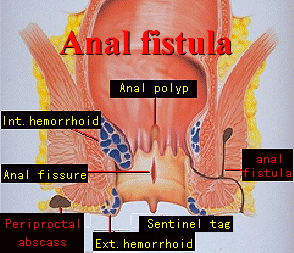

| What anal fistula is If the following symptoms appear, it may be anal fistula: the area around the anus suppurates, and the hole does not close up after the incision or after discharge of pus, the pus continues to discharge; or it starts to swell up when you thought it was cured, and the discharge of pus repeats. The cause of anal fistula The dentate line is the borderline between the anus and the rectum, and it is very painful when bacteria enters from the area it caves inward (anal crypt), suppurates and produces abscess(accumulated pus). It is called periproctal abscess at this stage. It is called anal fistula when the accumulated pus spreads around, breaks the skin and discharges pus, the hole the breaking made does not close up, and forms a pipe linked to the inside of the anus. Treating anal fistula Periproctal abscess: The pain increases as pus accumulates, and one might have a fever at this stage. The symptoms will ease when the pus gets out, so the patient is put under local anesthesia and an incision is made to let the pus out. Then, he/she can wait for the inflammation to cease by taking a painkiller or an antibiotic afterwards. The festering may seem to have ceased for the time being, but it starts up again and becomes anal fistula in many cases. Anal fistula: A surgery must be done on anal fistula that has already formed a distinctive fistula. If one leaves it alone, without any surgery, the anal fistula may branch out and become more complex, or a cancer might develop from it. In any case, I advise you to have surgery as soon as possible. |